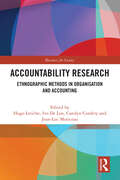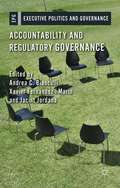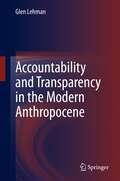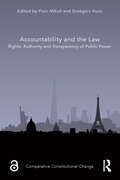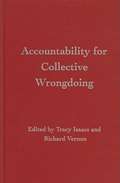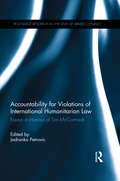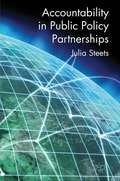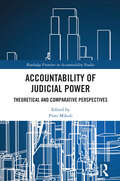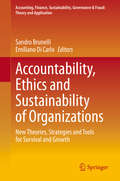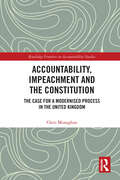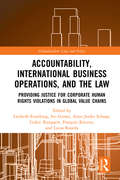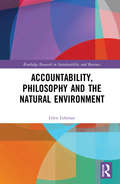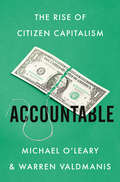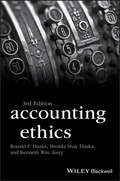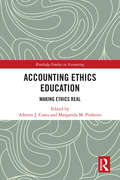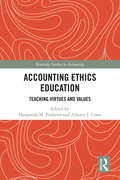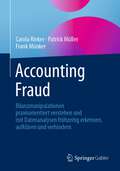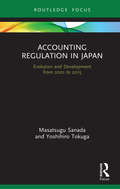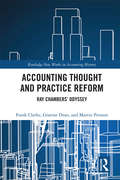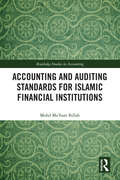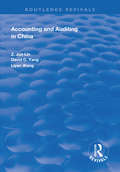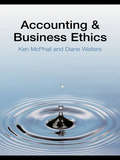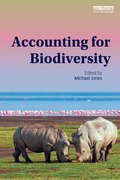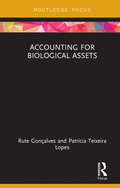- Table View
- List View
Accountability Research: Ethnographic Methods in Organisation and Accounting (Business for Society)
by Hugo Letiche Jean-Luc Moriceau Ivo De Loo Carolyn CorderyThis book discusses (auto- )ethnographies of accountability, undertaken (in close collaboration) by a multinational group of accounting and organization theory researchers over a period of three years. The key assumption underlying the book is that accountability is inherently an identity- creating process where the study of account- making has to be done participatively, with radical openness to the one(s) being researched, as well as to their context. That openness we call ‘ethnography’. The values or assumptions inherent to the practices of account and identity-making, in a specific context, are what (auto- )ethnographies seek to describe and identify. These values and assumptions warrant critical, ethical reflection, and this is what the researchers presented here have tried to provide.The chapters in this book all are mini- studies of relatedness. The scale of examination is intimate; the reflections provided by the researchers are mainly methodological.This book is of interest to accounting and organization theory students and scholars who believe that accountability can fruitfully be studied through (auto-) ethnography. The book extends currently existing views on how accountability can be handled and discharged between researchers and their researched, when local, intimate settings are studied.
Accountability and Regulatory Governance
by Andrea C. Bianculli Xavier Fern�ndez-i-Mar�n Jacint JordanaThis collection improves our understanding of the problems associated to accountability in regulatory governance, focusing on audiences, controls and responsibilities in the politics of regulation and through a systematic exploration of the various mechanisms through which accountability in regulatory governance
Accountability and Transparency in the Modern Anthropocene
by Glen LehmanThe book is about accountability processes and how they contribute solutions to our current environmental and global political problems. This book is different to other literature in this field. This is so because the dominant accountability discourse is shaped by what is defined as a neoliberal business case for social and environmental reform. This book assumes a nirvana stance within globalisation where all citizens operate within the parameters of the free market and will recover from adverse economic and political damage. Further this book uses neoliberalism and free-market reforms aims as examples to implement efficient management technologies and create more competitive pressures. Central to the argument of the book are perspectives on authenticity, expressivism and interpretivism which are found to provide a radical reworking of our understanding of being in the world. These frameworks offer a starting point for rethinking the way individuals, businesses and communities ought to be dealing politically with accountability and ecological crises. The argument builds to an accountability perspective that utilises work from expressivism, interpretivism, classical liberalism and postmodern theory. The theoretical quest undertaken in this book is to develop connections between accountability, democratic, ethical and ecological perspectives.
Accountability and the Law: Rights, Authority and Transparency of Public Power (Comparative Constitutional Change)
by Piotr Mikuli; Grzegorz KucaThis book discusses contemporary accountability and transparency mechanisms by presenting a selection of case studies. The authors deal with various problems connected to controlling public institutions and incumbents’ responsibility in state bodies. The work is divided into three parts. Part I: Law examines the institutional and objective approach. Part II: Fairness and Rights considers the subject approach, referring to a recipient of rights. Part III: Authority looks at the functional approach, referring to the executors of law. Providing insights into increasing understanding of various concepts, principles, and institutions characteristic of the modern state, the book makes a valuable contribution to the area of comparative constitutional change. It will be a valuable resource for academics, researchers, and policy-makers working in the areas of constitutional law and politics.
Accountability and the Law: Rights, Authority and Transparency of Public Power (ISSN)
by Piotr Mikuli Grzegorz KucaThis book discusses contemporary accountability and transparency mechanisms by presenting a selection of case studies.The authors deal with various problems connected to controlling public institutions and incumbents’ responsibility in state bodies. The work is divided into three parts. Part I: Law examines the institutional and objective approach. Part II: Fairness and Rights considers the subject approach, referring to a recipient of rights. Part III: Authority looks at the functional approach, referring to the executors of law. Providing insights into increasing understanding of various concepts, principles, and institutions characteristic of the modern state, the book makes a valuable contribution to the area of comparative constitutional change.It will be a valuable resource for academics, researchers, and policy-makers working in the areas of constitutional law and politics.
Accountability for Collective Wrongdoing
by Richard Vernon Tracy IsaacsIdeas of collective responsibility challenge the doctrine of individual responsibility that is the dominant paradigm in law and liberal political theory. But little attention is given to the consequences of holding groups accountable for wrongdoing. Groups are not amenable to punishment in the way that individuals are. Can they be punished - and if so, how - or are other remedies available? The topic crosses the borders of law, philosophy, and political science, and in this volume specialists in all three areas contribute their perspectives. They examine the limits of individual criminal liability in addressing atrocity, the meanings of punishment and responsibility, the distribution of group punishment to a group's members, and the means by which collective accountability can be expressed. In doing so, they reflect on the legacy of the Nuremberg Trials, on the philosophical understanding of collective responsibility, and on the place of collective accountability in international political relations.
Accountability for Violations of International Humanitarian Law: Essays in Honour of Tim McCormack (Routledge Research in the Law of Armed Conflict)
by Jadranka PetrovicInternational criminal adjudication, together with the prosecution and appropriate punishment of offenders at a national level, remains the most effective means of enforcing International Humanitarian Law. This book considers the various issues emanating from present-day breaches of norms of International Humanitarian Law (IHL) and the question of how impunity for such breaches can be tackled. Honouring the work of Timothy McCormack, Professor of International Law at the University of Melbourne and a world renowned expert on IHL and International Criminal Law, contributors of the book explore the interplay between the rules governing accountability for violations of IHL and other areas of law that impact the prosecution of war crimes, including international criminal law, human rights law, arms control law, constitutional law and national criminal law. In providing a contemporary consideration of the various issues emerging from present-day breaches of norms of IHL, especially in light of growing interest in ‘fragmentation’ and ‘normative pluralism’, this book will be of great use and interest to students and researchers in public international law, international law, and conflict studies.
Accountability in Public Policy Partnerships
by Julia SteetsA PDF version of this book is available for free in open access via the OAPEN Library platform, www. oapen. org . This book presents a new model of accountability which ensures that public-private partnerships don't erode public accountability. It defines concrete accountability standards for different types of partnerships.
Accountability of Judicial Power: Theoretical and Comparative Perspectives (Routledge Frontiers in Accountability Studies)
by Piotr MikuliThis book brings together a group of international scholars to discuss theoretical and comparative considerations of judicial accountability. Accountability of the judiciary is an essential element in a democratic state ruled by law. Its design must take into account the need to ensure both the legitimacy of the judiciary and its independence. The work discusses accountability in the light of recent research, including studies on the crisis of the rule of law in the contemporary world. The book adopts a broad approach to accountability, which has various facets, referring both to the courts, that is the organisational element of the judicial branch of government, and to judges, its individual dimension. It is divided into four parts: the first deals with the essence of the concept of accountability of the judiciary; the second discusses the emerging standards relating primarily to the individual accountability of judges; and the third discusses the position of constitutional judges through the lens of accountability. The fourth and final part provides a detailed consideration of the specific accountability mechanisms. The book will be a valuable resource for academics, researchers, and policymakers working in the areas of constitutional law and politics, and accountability studies.
Accountability, Ethics and Sustainability of Organizations: New Theories, Strategies and Tools for Survival and Growth (Accounting, Finance, Sustainability, Governance & Fraud: Theory and Application)
by Sandro Brunelli Emiliano Di CarloThis book explains how the traditional paradigm of private and public organizations is changing as a result of the multiple factors that are affecting the way in which goods and services are produced, and for whom they are produced. In view of these disruptive trends, the theory of the firm needs to be updated and to some extent rethought. Moreover, diverse challenges and opportunities such as climate change, aging populations, and new public accountability requirements are necessitating novel frameworks to ensure the long-term survival of public and private organizations. Against this backdrop, the authors contribute to the debate over the firm’s primary interest by proposing a new way of viewing the nature of the firm and its relationship with stakeholders. In addition, they carefully analyze the challenges and opportunities mentioned above, evaluating their significance for various important aspects of organizations through different lenses. Global in scope, the book also takes the United Nations Sustainability Development Goals into account. Accordingly, it will be of interest to all readers seeking a better understanding of the evolving nature of firms and organizations in our changing world.
Accountability, Impeachment and the Constitution: The Case for a Modernised Process in the United Kingdom (Routledge Frontiers in Accountability Studies)
by Chris MonaghanThis book sets out and explores the case for a modernised impeachment process for the United Kingdom. The work examines the present law and history of impeachment in the United Kingdom, which today is widely regarded as having fallen into desuetude and its procedures inappropriate for modern conditions. It discusses how impeachment operates in two countries, the United States and Denmark, selected respectively for their marked differences from and similarities to the United Kingdom’s political and constitutional system, for the purposes of illumination and possible lessons for a new impeachment process. The book seeks to provide a balanced and independent examination of the case for this, concluding that it would have a valuable role to play in the future development of the United Kingdom’s system of politics and government. It concludes by setting out a detailed model for the structure, working and effect of impeachment. The book will be of interest to students, academics and policy-makers working in the areas of constitutional law and politics.
Accountability, International Business Operations and the Law: Providing Justice for Corporate Human Rights Violations in Global Value Chains (Globalization: Law and Policy)
by Cedric Ryngaert Liesbeth Enneking Ivo Giesen Anne-Jetske Schaap François Kristen Lucas RoordaA consensus has emerged that corporations have societal and environmental responsibilities when operating transnationally. However, how exactly corporations can be held legally accountable for their transgressions, if at all, is less clear. This volume inquires how regulatory tools stemming from international law, public law, and private law may or may not be used for transnational corporate accountability purposes. Attention is devoted to applicable standards of liability, institutional and jurisdictional issues, and practical challenges, with a focus on ways to improve the existing legal status quo. In addition, there is consideration of the extent to which non-legal regulatory instruments may complement or provide more viable alternatives to these legal mechanisms. The book combines legaldoctrinal approaches with comparative, interdisciplinary, and policy insights with the dual aim of furthering the legal scholarly debate on these issues and enabling higher quality decision-making by policymakers seeking to implement regulatory measures that enhance corporate accountability in this context. Through its study of contemporary developments in legislation and case law, it provides a timely and important contribution to the scholarly and sociopolitical debate in the fastevolving field of international corporate social responsibility and accountability.
Accountability, Philosophy and the Natural Environment (Routledge Research in Sustainability and Business)
by Glen LehmanUsing a philosophical and interdisciplinary approach, this book looks at how accountability can provide solutions to our current environmental and global political problems. When a social system has external elements imposed upon it, or presented to it, political problems are likely to emerge. This book demonstrates that what is needed are connecting social elements with a natural affinity to bring people together despite their differences. This book is different from others in the field. It provides new insights by critiquing the extant understandings of accountability and expands the possibilities by building on Charles Taylor’s philosophies. Central to the argument of the book are perspectives on authenticity and expressivism which are found to provide a radical reworking of our understanding of being in the world, and a starting point for rethinking the way individuals and communities ought to be dealing politically with accountability and ecological crises. The argument builds to an accountability perspective that utilises work from interpretivism, liberalism, and postmodern theory. The book will be of interest to researchers in environmental philosophy, critical perspectives on accounting, corporate governance, corporate social reporting, and environmental accounting.
Accountable: The Rise of Citizen Capitalism
by Michael O'Leary Warren Valdmanis“More than ever before, this is the book our economy needs.” – Dr. Rajiv Shah, president of the Rockefeller Foundation“Unwilling to settle for easy answers or superficial changes, O’Leary and Valdmanis push us all to ask more of our economic system.” – Senator Michael F. BennetThis provocative book takes us inside the fight to save capitalism from itself.Corporations are broken, reflecting no purpose deeper than profit. But the tools we are relying on to fix them—corporate social responsibility, divestment, impact investing, and government control—risk making our problems worse.With lively storytelling and careful analysis, O’Leary and Valdmanis cut through the tired dogma of current economic thinking to reveal a hopeful truth: If we can make our corporations accountable to a deeper purpose, we can make capitalism both prosperous and good.What happens when the sustainability-driven CEO of Unilever takes on the efficiency-obsessed Warren Buffett? Does Kellogg’s—a company founded to serve a healthy breakfast—have a sacred duty to sell sugary cereal if that’s what maximizes profit? For decades, government has tried to curb CEO pay but failed. Why? Can Harvard students force the university to divest from oil and gas? Does it even matter if they do?O’Leary and Valdmanis, two iconoclastic investors, take us on a fast-paced insider’s journey that will change the way we look at corporations. Likely to spark controversy among cynics and dreamers alike, this book is essential reading for anyone with a stake in reforming capitalism—which means all of us.
Accounting Ethics (Foundations of Business Ethics #5)
by Brenda Shay Duska Ronald F. Duska Kenneth Wm. KuryAn accountant’s practice depends on making difficult decisions. To achieve the best results, individual accountants and accounting firms need a clear understanding of the ethical duties and decision-making involved in the four major functions of modern accounting—auditing, management accounting, tax accounting, and consulting—as well as a strong sense of ethical conduct to guide the certification and validation of reliable financial records. Now in its third edition, Accounting Ethics is a thorough and engaging exploration of the ethical issues that accountants encounter in their professional lives. Since the publication of the first edition in 2002, Accounting Ethics has become an indispensable resource for accounting courses and certification programs worldwide, known for its focus on real-world application, practical advice, reader-friendly guidance, and its insight into the effects of global change on the profession. Together with coverage of the contemporary regulatory environment—including the Sarbanes-Oxley Act, the Public Company Accounting Oversight Board, and the Dodd–Frank Wall Street Reform and Consumer Protection Act—this revised edition features expanded pedagogical resources such as new end-of-chapter case studies and discussion questions, and includes the updated AICPA Code of Conduct. Concise and dependable, Accounting Ethics sustains its reputation as an authoritative resource for practicing accountants, new professionals, students of accounting, and those who are considering the profession.
Accounting Ethics Education: Making Ethics Real (Routledge Studies in Accounting)
by Alberto J. Costa; Margarida M. PinheiroAccounting education ought to prepare future professionals to enter a principles-based, rules-oriented field of activity wherein technical knowledge of accounting standards (principles, rules and decision procedures) and ethical awareness (the capacity to discern moral issues and resolve ethical dilemmas) are crucial. Accounting education is best performed by the accountant’s adherence to the principles of the accounting profession and by individuals and firms following the appropriate rules, act according to the codes of conduct adopted by their profession, exercise clear judgment whenever they address financial transactions and consider/assess the state of a given business. Accounting Ethics Education: Making Ethics Real gathers a diversity of contributions from invited well-known experts and other specialists. It promotes comprehensive reflection around key trends, discussing and highlighting the most updated research on accounting ethics education, being an essential and useful reference in the field. In the performance of accounting tasks, the accountant should be educated and supported in the skills development and habit formation to solve accounting problems, recognize moral issues and resolve ethical dilemmas that will be encountered in their special tasks. Also, this book provides a moral map for identifying and acting on values when difficult situations arise. Examining multiple perspectives, the book improves the scholarly debate by providing cutting-edge and insightful research vital for all those interested and immersed in these matters. It will be of great value to academics, students, researchers and professionals in the fields of accounting, accounting education and ethics.
Accounting Ethics Education: Teaching Virtues and Values (Routledge Studies in Accounting)
by Margarida M. Pinheiro; Alberto J. CostaAccounting Ethics Education: Teaching Virtues and Values gathers a diversity of contributions from invited, well-known experts. It promotes a comprehensive reflection around how ethics can and should be taught to accounting students, discussing and highlighting the most updated research on accounting ethics education, and it is an essential reference in the field. The subject of accounting ethics education is critical to foster ethical awareness that may prevent the way in which one acts or behaves, especially towards others. The point is that accounting education cannot exist without ethical education and accountants must be technically proficient and ethically sensible since ethical behavior is vital to the status and credibility of the accountancy profession. And this sensibility must be developed while the future professional is still cultivating his or her moral and intellectual structure within the school learning environment: character and practical reasoning are crucial because they include not only knowledge of rules and principles, and their correct application but also values and virtues. Examining multiple perspectives, Accounting Ethics Education: Teaching Virtues and Values advances the scholarly debate by providing cuttingedge and insightful research vital for all those interested and immersed in these matters. It begins with a historical perspective of accounting ethics education and continues by exploring challenges, opportunities and developments in the area. It will be of great value to academics, students, researchers and professionals in the fields of accounting, accounting education and ethics.
Accounting Fraud: Bilanzmanipulationen praxisorientiert verstehen und mit Datenanalysen frühzeitig erkennen, aufklären und verhindern
by Carola Rinker Patrick Müller Frank MünkerDieses Buch beschreibt, welche typischen Fälle von Bilanzmanipulationen auch im Alltag von Konzernen und KMUs vorkommen können, durch Mitarbeiter und Dienstleister. Das Bewusstsein für Accounting Fraud ist oft nicht vorhanden. In diesem Buch werden branchentypische Besonderheiten der Bilanz und GuV aufgegriffen. Die Autoren erläutern verschiedene Manipulationsarten und zeigen, wie diese aufgedeckt werden können. Zudem wird erklärt, welche Maßnahmen Unternehmen zur Früherkennung und Prävention ergreifen können, beispielsweise durch den Einsatz forensischer Datenanalyse. Dieses Buch veranschaulicht, wie wichtig es für Praktiker ist, sich dem Thema zu widmen, auch anhand von Praxisbeispielen.
Accounting Regulation in Japan: Evolution and Development from 2001 to 2015 (Routledge Focus on Accounting and Auditing)
by Masatsugu Sanada Yoshihiro TokugaLittle has been published on accounting standards in Japan and how they have developed. The purpose of this study is to construct a historical narrative of the interplay between accounting standards in Japan and theories of regulation. The authors demonstrate that delegation of the authority for accounting standard setting to the private sector in Japan is incomplete, and thus, the role of the public sector remains important. In the discussion about IFRS implementation in Japan, the movement in the United States, industry opinions, and ideological conflict between fair value versus historical cost play important roles. These elements combined led to the ambiguous coexistence of four sets of accounting standards in Japan. First, by using an explaining-outcome process-tracing method, the authors examine how these sets of standards occurred and explore the significance of each. Second, they deliver an explanation of this unique coexistence through the lens of theories of regulation. In doing so, they provide an overview of the history of the recent development of accounting regulation in Japan and offer an up-to-date response to current affairs or policy debates in Japan that have been rapidly changing. Providing a rare insight into accounting regulation in Japan, an IFRS non-application country, this concise text will be of great interest to researchers and advanced students in international accounting and accounting regulation.
Accounting Thought and Practice Reform: Ray Chambers’ Odyssey (Routledge New Works in Accounting History)
by Frank Clarke Graeme William Dean Martin E PerssonRaymond John Chambers was born just over a century ago on 16 November 1917. It is more than fifty years since his first classic, Accounting, Evaluation and Economic Behavior, was published, more than forty since Securities and Obscurities: Reform of the Law of Company Accounts (republished in 1980 as Accounting in Disarray) and over twenty since the unique An Accounting Thesaurus: Five Hundred Years of Accounting. They are drawn upon extensively in this biography of Chambers’ intellectual contributions, as are other of his published works. Importantly, we also analyze archival correspondence not previously examined. While Chambers provided several bibliographical summaries of his work, without the benefits of reviewing and interspersing the text with correspondence materials from the Chambers Archive this study would lack an appreciation of the impact of his early childhood, and nuances related to his practical (including numerous consultancies) and academic experiences. The ‘semi-biographical narrative’ codifies article and editorial length exercises by the authors drawing on parts of the archive related to theory development, measurement and communication. Other parts are also examined. This allows us to respond to those critics who claim his reforms were naive. They further reveal a man of theory and practice, whose theoretical ideas were solidly grounded on observations from his myriad interests and experiences. Many of his practical experiences have not been examined previously. This approach and the first book-length biography differentiates this work from earlier analyses of Chambers’ contribution to the accounting literature. We provide evidence to support the continued push for the reforms he proposed to accepted accounting thought and practice to ensure accounting is the serviceable technology so admired by Pacioli, Da Vinci and many other Renaissance pioneers. It will be of interest to researchers, educators, practitioners and regulators alike.
Accounting and Auditing Standards for Islamic Financial Institutions (Routledge Studies in Accounting)
by Mohd Ma'Sum BillahWhile accounting and audit functions are significantly regulated and standardized in conventional financial industries and activities, through the implementation of International Accounting Standards, and International Financial Reporting Standards, as well as other international, regional, and local regulations, this is not the case for Islamic financial organizations. Rather than having their own set of comprehensive accounting or auditing standards or policies, these are based, in some cases, on the Accounting and Auditing Organization for Islamic Financial Institutions (AAIOFI), the Islamic Financial Services Board (IFSB)’s standards and Shari’ah based local policies. This book is a timely and comprehensive overview of accounting and auditing standards within the doctrine of Shari’ah. It offers a significant contribution to the field and a wealth of technical know-how. It analyzes Islamic accounting and auditing both in theory and practice and from a distinctly international perspective. The chapters are arranged in a systematic and logical way making it easily accessible and engaging. The book evaluates the existing standards and widens the scope of the discourse to include Maqasid al-Shari’ah, Islamic accounting and audit models and standards, as well as, offering practical policy recommendations. The author presents a Shari’ah justified solution to Islamic Accounting and Audit and offers guidance on overcoming the challenges to implementing Islamic Accounting and Auditing Standards. The book is a unique and exhaustive guide and, as such, will be an invaluable resource for academics, researchers, students, policymakers, as well as, practitioners in accounting and auditing firms and financial institutions.
Accounting and Auditing in China (Routledge Revivals)
by Z. Jun Lin David C. Yang Liyan WangFirst published in 1998, this book provides an updated introduction to accounting and auditing in China, incorporating the most recent developments up to June 1997. It covers all major aspects of Chinese accounting and auditing, including accounting administrative systems, qualifications and responsibility of Chinese accountants, accounting regulations or standards setting, cost and managerial accounting, financial reporting, statutory audit and public accounting, accounting for governments and non-profit organizations, business financing and taxation systems, EDP application in accounting, accounting education and research etc. Some of the main accounting and auditing legislation and standards are complied in the Appendix. The book will be an informative reference to readers, both business executives and professionals, outside of China. It can also be used as a textbook or teaching supplement for Universities and Colleges.
Accounting and Business Ethics: An Introduction
by Diane Walters Ken McPhailDespite the enormous impact of various accounting scandals on the accounting profession, the general malaise amongst the profession more broadly, and the significant legislative and institutional reforms that have taken place as a result, there are still surprisingly few textbooks on accounting ethics. This concise introductory text takes a broad view of ethics and accounting, taking into account contemporary social trends, such as globalization and terrorism. Rather than delineating codes of professional conduct, this text pushes the reader towards an understanding of the nature of ethical dilemmas and the factors that influence the ways in which accountants frame ethical questions. The book is divided into two parts. The first part focuses on developing thinking about the different kinds of ethical questions that could be posed in relation to accounting. The second part focuses more explicitly on accounting practice, exploring the ethical function of accounting in relation to the market economy, ethics in relation to the accounting profession, and the ethics of the international accounting harmonization project. Accounting and Business Ethics is a compact introduction aimed at both students and practitioners who want to understand more about the ethics of accounting.
Accounting for Biodiversity: Accounting For Biodiversity
by Michael Jones‘Biodiversity’ at its simplest, refers to the variety of species inhabiting Planet Earth. It is essential to the well-being of the planet. There is now a scientific consensus around the current ongoing crisis in biodiversity arising from both climate change and human activities. Experts believe we are in the middle of a mass extinction of biodiversity with devastating consequences for our planet. Accounting for Biodiversity explores the need for companies to actively protect, conserve and improve biodiversity within their sphere of operation. The 14 chapters written by a selected team of experts investigate the ways in which companies are embracing their responsibility through a variety of biodiversity initiatives and innovative models designed to improve the recording, reporting and valuing of biodiversity. Global case studies look at biodiversity accounting in Africa, Asia, Australasia, Europe and South America. Overall, this book provides a comprehensive set of reflections on accounting for biodiversity and recommendations for the future. This book is essential reading for all those interested in the contribution that accounting can make to the preservation of biodiversity. As we see increasing awareness of the importance of sustainability and ecological responsibility in business activity it is relevant and should prove informative to students, managers, accountants and those in business more generally. It is also important for all those interested in conserving biodiversity.
Accounting for Biological Assets (Routledge Focus on Business and Management)
by Rute Gonçalves Patrícia Teixeira LopesThis book explores accounting for biological assets under IAS 41 – Agriculture, and explains the recent adjustments introduced by the IASB which allow firms to choose between cost or revaluation models concerning mature bearer plants. Identifying the firm and country-level drivers that inform the disclosure and measurement practices of biological assets, this concise guide examines the value relevance of measuring those assets at fair value. It also analyses how firm and country-level drivers explain the differences in the disclosure level and practices used to measure biological assets under IAS 41. Finally, it evaluates whether there is a difference in the relevance of biological assets among the listed firms with high and low disclosure levels on biological assets. Based on a major international study of a wide selection of firms and country-level drivers, this book is vital for standard setters, stakeholders, students, accountants and auditors who need to understand disclosure and measurement practices of biological assets under IAS 41.
